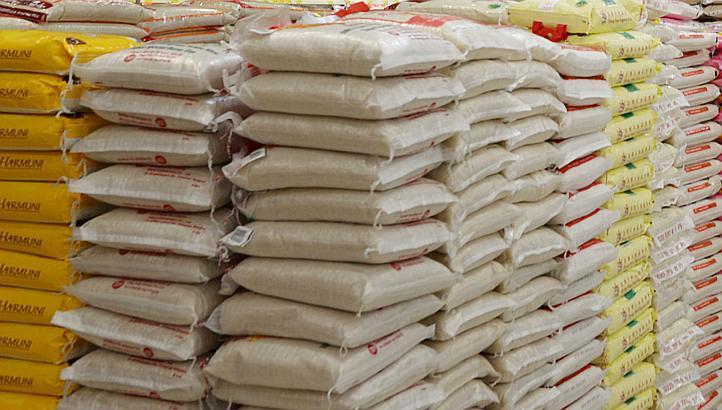The price of a 50kg bag of foreign rice has surged to over N88,000 across major stores in Nigeria, which is 22.2% higher than the N72,000 recorded earlier in the month.
In the same vein, locally made rice increased by almost the same rate (21.8%) to N67,000 in just less than a month. This information comes from findings by the Nairametrics Research team. Compared to the same period last year, the price of foreign rice has increased by 244%, while local rice has witnessed a 209% price increase in the same period.
During a conversation with Mrs. Olanike, a rice dealer at Daleko market in Lagos, she explained that the recent rise in the price of local rice has been largely driven by the surge in the price of foreign rice, which is a result of the depleting value of the naira and the continuous ban on the item.
It’s worth noting that the exchange rate between the naira and other currencies has depreciated significantly in recent times, losing over 45% and 30% year-to-date at the official and parallel market, respectively.
Recommended reading: “Rice price to increase by 32%, production to grow by 3.6% in 2024”- Report
Food inflation at over 18-year high
Recent inflation data from the National Bureau of Statistics (NBS) revealed that food inflation rose to 35.71% in January 2024, the highest level since August 2005.
According to the NBS, food inflation in January was driven by increases in price of bread and cereals, potatoes, yam and other tubers, oil and fat, fish, meat, coffee, tea, and cocoa.
- Meanwhile, a further analysis shows that imported food inflation rose to 26.3% from 24.9% recorded in the previous month. This represents the highest rate recorded since January 2012 as FX volatility as well as low agricultural production drive surge in food prices.
- Also, GDP data has indicated slow growth in the Nigerian agricultural sector in the last two years, hampered by insecurity, impact of global supply chain issues on fertilizer and seed supply, climate change, and flooding.
- Notably, the agricultural sector only grew by 1.13% in 2023, in contrast to 1.88% recorded in the previous year.
Recommended reading: Nigeria’s inflation hits 29.90% in January 2024
Drivers of food inflation in Nigeria
In an exclusive interview with Ibrahim Maigari, the founder and CEO of RiceAfrika, a tech-driven agriculture optimization service provider, he highlighted some of the factors contributing to the hike in the price of rice in the country.
- He stated that a significant backlog of unmet food demand in the past three years as a result of the Covid-19 pandemic, insecurity, Russia-Ukraine war, and flooding is the major driver of food inflation in Nigeria.
- “The flood in 2022 destroyed about 8.6 million metric tonnes of 14 variety of crops in the country,” he said. In addition to the dwindling production of food in the country, the rising cost of transportation caused by the removal of petrol subsidy has impacted the final cost of food. “To transport a truck of food items from Maiduguri to Lagos has risen to almost 6 million from less than a million,” he added.
- He also added that the cost of harvesting a plot of farmland has increased from an average of N90,000 in 2022 to about N230,000, representing 156% increase in two years.
On the solution
Ibrahim Maigari suggested a combination of seven strategies to drive down the price of food items and improve production in the country, which he termed as the Farm Easy Operating System. According to him, a wholistic approach is required to address the issue of food security in Nigeria.
- According to Mr. Ibrahim, this approach requires improved land preparation. He noted that 80% of farmers in Sub-Sahara Africa prepare their lands manually, which impacts the level of productivity of the farmers. He also added that access to high-yielding seeds, will improve food production in the country, citing that 82% of farmers in the region plant grains rather than actual seeds, which is less yielding.
- He pointed to the lack of quality chemicals as a major stumbling block in Nigeria’s agricultural practices, which has resulted in several losses for the farmers. He opined that the availability of quality chemicals in the process of planting and weeding will improve agro-yields in the country.
In addition, timely delivery of fertilizer is essential to ensure improved food production in Nigeria. The best time to deliver fertilizer to farmers is between March and April, however, what we notice in most times is that the farmers take delivery of these fertilizers around June and July, which is supposed to be a time for harvesting.
The others as highlighted by Mr. Ibrahim include best agronomic practices, adoption of mechanized family as well as access to market.
Bottom line
The problem of food inflation continues to be a major bane to most Nigerians, who already spend about 55% of their household expenditures on food items.
The recent trend of high inflation has significantly eroded the purchasing power of average Nigerians and the government will need a combination of policies to urgently address the food crisis in the country.
